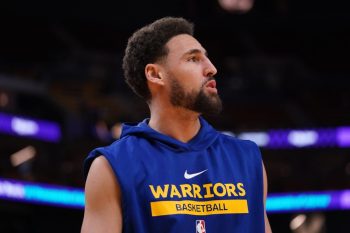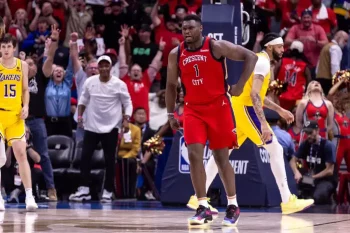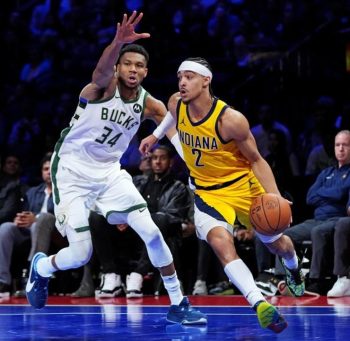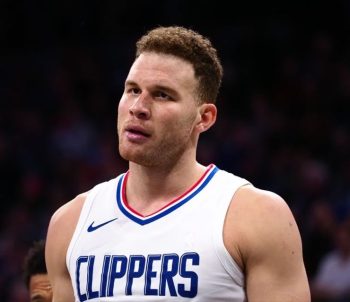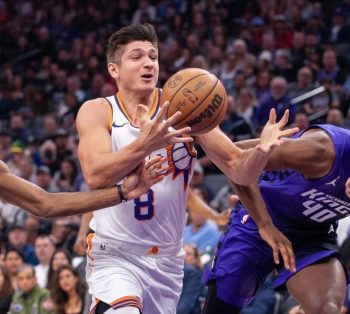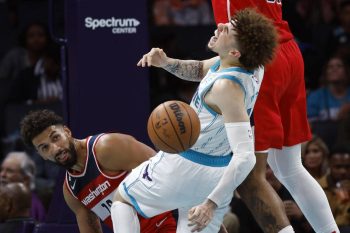NBA
NBA PM – Now What? – Cleveland Cavaliers

Ahoy, ahoy Bball junkies! Upon resuming Basketball Insiders’ Now What? Series, we now take a look at the post-LeBron Cleveland Cavaliers 2.0 in Year 3. Because of these new play-in guidelines, the Cavaliers were technically in the playoff hunt for most of the season. Even if there’s a solid argument that calling their season a “bid” for the playoffs is looking at the glass barely full and not almost empty, Cleveland’s future looks like it’s going somewhere. Say what you will, but that’s a vast improvement over the post-LeBron Cavs 1.0.
We all knew that it would take time for Cleveland to rebuild itself after LeBron left them in the dust. Again. But hey, at least this time, there’s no Anthony Bennett to underwhelm or hiring of previously failed coaches or even desperate flailing just to get to the playoffs. At least, not yet.
In the last three years, progress is coming in baby steps for the Cavs. Of course, losing the majority of your games is never a pleasant watch, and there have been some bumps and bruises along the way, but the Cavaliers are playing this about as cool as they should be. Sure, they long for the days of LeBron and Kyrie, but thus far, management hasn’t screwed this pooch as previous ones have.
So what have been the fruits of their efforts since having to start over again in 2018? Let’s start at the top
Strengths
You know how earlier, I mentioned that current Cleveland management has run this team better thus far than previous ones? Well, that starts with drafting.
There will continue to be questions surrounding if Collin Sexton and Darius Garland will be an effective pairing long-term until they prove it in wins, but one thing is for sure- both improved this year from a statistical perspective. Via Basketball-Reference-
Sexton’s averages last year: 20.8 points, Three assists, 38 percent from distance, 47.2 percent overall
Sexton’s averages this year: 24 points, 4.4 assists, 37.1 percent from distance, 47.5 percent overall.
Not too major of a jump, but the improved playmaking and maintaining his efficiency while having more shots should stand out because doing that is not as easy as it looks. As for Garland-
Garland’s averages last year: 12.3 points, 3.9 assists, 35 percent from distance, 40.1 percent overall.
Garland’s averages this year: 17.5 points, 6.1 assists, 39.5 percent from distance, 45.1 percent overall.
Garland made the bigger all-around jump than Sexton, but that was because he had more room to grow. His jump also showed itself more towards the end of the season, which is very encouraging. So much so that there’s no reason for Cleveland not to see this pairing through.
Speaking of late-season surges, Isaac Okoro saved his best for last too. 16.6 points on 42/30/73 splits for the month of May is sure to catch a crowd’s eye, and his 32-point surge against Phoenix in an overtime thriller only makes his potential all the more salivating.
Time will tell whether Sexton, Garland, or Okoro will qualify as “the guy” on your next championship team. But, at the very least, they’re a start. Factor the young and energetic Jarrett Allen, who, let’s face it, they flat-out stole in the James Harden trade, and this is a solid foundation to go off of. Success may not come right away, but the higher-ups should give this core a pretty long leash. Just not too long, or they might end up like Orlando.
And you know what else? Even if there was some drama along the way, at least none of it came from their coach. That’s a steady improvement with everything that went down last year.
Weaknesses
Even though Cleveland has accumulated some fantastic individual talent since 2018, the whole is greater than the sum of its parts never rings truer than for the Cavaliers. Some of the parts in The Land may impress, but Cleveland as a whole certainly does not. Literally. There’s no statistic to be seen regarding the Cavaliers that will jump out at you. They had the third-lowest offensive rating (105.8) and the sixth-lowest defensive rating (114.4) and only had a net rating (minus-8.6) better than Orlando than Oklahoma City. Their traditional stats tell an even worse story.
Oh well, there certainly must have been some traditional statistic that shows that they were at least average, right?
Uh… sure? They ranked 12th in steals per game (7.7), but other than that, their traditional stats varied from below average to league-worst. According to Basketball-Reference, these were how they ranked in traditional stats on average:
-Points: 103.8 (30th)
-Assists: 23.8 (21st)
-Rebounds: 42.8 (24th)
-Three-point percentage: 33.6 (30th)
-Three-point attempts: 29.7 (28th)
-Three-point makes: 10 (29th)
-Blocks: 4.5 (Tied-for-20th)
-Overall Field Goal Percentage: 45.0 (25th)
Glass Half-full take: It should only go up from here.
Opportunities
See, as bad as those statistics above look, it’s only because the seeds Cleveland has planted have only begun to sprout. Is anyone seriously going to be mad at a flower for barely growing if it’s only been a week into the spring season? Of course not. With another high lottery pick to develop from what’s been regarded as a pretty loaded draft class, the Cavaliers have a young core that should breed intrigue. Neither Sexton nor Garland are prospects to sneeze at. If Okoro builds off of the numbers he put up late in the season, neither will he.
It’s clear that Cleveland has an eye for young talent, and they’re willing to do what it takes to get it. Take the Kevin Porter Jr. drafting, for example. Sure, that didn’t end well, but they knew KPJ’s talent was worth the risk. So even if he’s not fulfilling his promise for Cleveland, he’s justifying their reasoning. If that’s the case, then Cavs fans should trust who management wants.
Between drafting Porter and not having to trade any assets for Jarrett Allen, there’s clearly some savvy among these Cleveland execs. It’s not pretty now, but it’d be foolish to think it won’t get better from here.
Threats
Stop if you’ve heard this one. Kevin Love has no place on this Cavaliers team. That’s been the case for the last three years, and it will not change anytime soon. The knee-jerk reaction has evidently been to get rid of him but is there anyone out there who’s willing to pay $60+ million for someone who:
-Played only 103 games combined over the last three seasons?
-Is coming off 12-point/7-rebound/2.5 assist averages on 41/36/82 splits?
-Has openly sulked in a game on multiple occasions?
There’s certainly a history that Love has with Cleveland, given how long he’s been there. Fun fact: Only 11 players in the league have stayed longer with their current team than Love, and that could drop down to seven after free agency is said and done this summer – but he hasn’t fit their timeline since LeBron bolted. Of course, that didn’t stop him from getting a nice fat extension that very summer, but the point remains.
With Love entering the wrong side of 30, he shouldn’t be in Cleveland, but all indications say no one would consider trading for him, given everything that’s happened since 2018. So, Cleveland can either keep the Love train going until the contract expires (or expiring) or they can give him the Andre Drummond treatment.
This probably is not going to have a happy ending. But, on the flip side, both sides will probably be happy once it finally does.
A constant theme here from the get-go has been that, as bad as Cleveland as been for the past three years, a. that was to be expected in their situation and b. they are far from hopeless.
Having said that, Orlando was brought up earlier for a reason. They haven’t tasted anywhere close to the success that they did during the Dwight Howard era. At the beginning of the post-Dwight era, their management pulled off some savvy deals for quality players like Nikola Vucevic, Evan Fournier, and Tobias Harris on top of some solid drafting like Victor Oladipo and Aaron Gordon. Most of that got undone by ill-advised trades like swapping Oladipo and Domantas Sabonis’ draft rights for Serge Ibaka, and giving up Tobias Harris to Detroit for unwanted spare parts.
That all went down because management lost their patience too quickly. In case you missed it, they could have had Oladipo, Vucevic, Sabonis, Harris, Fournier, and Gordon all on the same team. Maybe that wasn’t a contender but it was a team that would have given them some options. Then they compounded it by playing that depleted core out. All it got them was nine total playoff games in the decade post-Dwight.
The Cavaliers should look at that and realize that time is on their side. It’s now on them to use it wisely.
